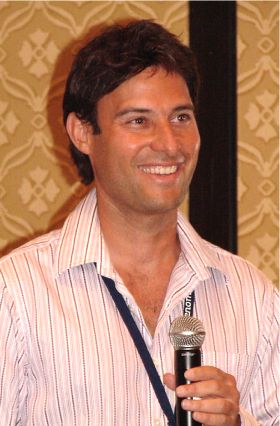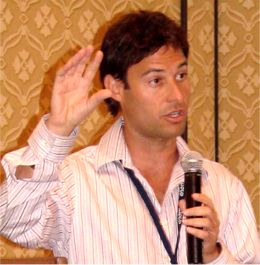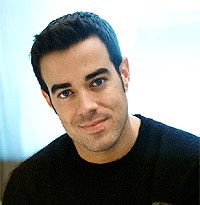|
Despite
having been founded less than a year ago (in May 2006), Demand
Media has already become one of true giants in the
domain industry. The mastermind behind the company’s meteoric
rise is a 37-year-old serial entrepreneur from Southern
California named Richard Rosenblatt. Rosenblatt is
best-known as the guy who transformed Intermix Media and
their marquee website, MySpace.com,
from a money-losing albatross into a half-billion dollar
racehorse. Less than 18 months after he became CEO at Intermix,
Rosenblatt had sopped up the sea of red ink and engineered a $580
million sale of the company to Rupert Murdoch’s News
Corp.
While
that was Rosenblatt’s biggest success, it was far from his
only triumph – in fact it wasn’t even his first half billion
dollar sale! In 1999, Rosenblatt sold a company he had founded
himself, iMall, to ExciteAtHome for $565
million. That same year he became the founding investor and
Vice Chairman of GreatDomains, a domain aftermarket sales
company that he then quickly ramped up and helped sell to Verisign
for $100 million in 2000.
|

Richard Rosenblatt
Co-Founder, Chairman and CEO
Demand Media, Inc.
|
|
Hitting
a home run is one thing, but doing it over and over again is
something else. Clearly Rosenblatt has something a lot of other
entrepreneurs do not. But what is it? I got part of the
answer the first time I met him. That was last month in Las
Vegas where Demand Media’s popular registration company, eNom.com,
held a summit conference for their resellers at the Venetian
Hotel (just before the the T.R.A.F.F.I.C.
West conference began at the same venue).
Rosenblatt
attended the eNom
Resellers Summit to fill the company’s partners in
on Demand Media’s plans to make the .TV extension into a
platform that would allow registrants to build their own
global video channels (more on that a bit later).
|

Rosenblatt
at the eNom Resellers Summit
Las Vegas - March 2007 |
As
soon as he began his talk, you could feel the genuine
enthusiasm and excitement Rosenblatt felt about his latest
project. Some people simply radiate a positive
energy that is infectious and inspiring. You see how
pumped up kids are when they open their Christmas
presents? That was Rosenblatt that day in Las Vegas and I
would bet that is him 365 days a year.
It
is an invaluable asset when you are trying to get
investors, partners and the general public behind what you
are doing. Of course, his track record alone would have
brought a lot of those people on board, but my guess is he
wouldn’t have that track record in the first place if he
didn’t have the kind of personal charisma he has.
If
you can say that someone was born to be an entrepreneur,
Rosenblatt could be held out as exhibit A. He grew up in a
tight knit family just over the hill from Los Angeles
in the San Fernando Valley. His mother was a
college professor and his dad was a computer scientist.
Rosenblatt told us “One of the more memorable moments
from my childhood was when my dad sold his science
consulting company, California Research and Technology,
to Titan. This sparked my entrepreneurial
spirit!” |
He
stayed near his home and family to attend college at UCLA,
then headed across town to earn a law degree at Southern Cal
in 1994. “I was never sure if I was going to practice law but I
was always fascinated by how the law impacted all aspects of
business and life,” Rosenblatt said. “I knew a legal education
would teach me to think in an organized manner and see all sides
of an issue. While I was an undergrad, I had the experience of
running my own small advertising firm that served local
businesses. That experience as an entrepreneur combined with my
law school education really made it easy for me to take on big
challenges and opportunities at an early age and rather quickly
– like forming iMall.”
Rosenblatt
started iMall the same year he got his law degree. While “user
generated content” has become a buzz phrase today (and was
the foundation for Rosenblatt’s success at MySpace) he actually
started using the concept 13 years ago at iMall.
| “The
idea for iMALL was simple – businesses could “open
shop” on the Internet and get traffic by placing their
store in a “mall” where larger marquee stores (back
then our big store was the Super Bowl website)
would help drive traffic for everyone,” Rosenblatt said.
“We incorporated user gen tools when we realized how
difficult it was to scale our business. Our merchants were
very particular about their stores and were constantly
asking for updates and changes. Therefore, we said
“how about letting the store owners do it themselves!” |

|
“The
biggest challenge was making it simple enough that these
“newbies” could do it all themselves. No one knows their
business as well as the owner of that business. So why not empower
them? Give them the tools and let them be able to build it
themselves.” Rosenblatt’s plan worked and in May of 1999
he was able to take iMall public.
Just two months later the sale of iMall to ExciteAtHome was
announced.
Rosenblatt,
then just 30 years old, had financial freedom. So what does an
entrepreneur do when that happens? Sit by the pool and drink
margaritas, sail around the world? Of course not - they look for a
new business challenge. Rosenblatt spent the next five
years with his hands in many pies. “I spent time on a number of
other companies and some worked very well, such as GreatDomains,
and others did not,” Rosenblatt said. “I had a challenging
year stint trying to resuscitate the fallen DrKoop.com as
interim CEO. That experience helped prepare me for the challenges
at Intermix and the post bubble times really helped me grow as an
entrepreneur and I think as a person as well.”
| Intermix
came calling in March 2004 and persuaded Rosenblatt to
sign on as CEO and Chairman of MySpace.com. The company
was floundering at the time but Rosenblatt quarterbacked a
complete turnaround in his 18 months there. When he
started Intermix had a |

|
| market
capitalization of approximately $70 million. By the
time the sale to News Corp was made, that number had
ballooned to over $650 million. Rosenblatt had
transformed MySpace.com from an unknown website into one
of the most popular destinations in Internet history. |
|

|
“I had learned at iMall that the user (the business in
that case) knows better than anyone what they want
from their online experience and my job was to give them
the tools to make it possible. When I was introduced to
MySpace it was so clear that the core attribute was
empowering individuals and that made immediate sense to
me,” Rosenblatt said. “Instead of a store, it was a
profile and individuals could control it and develop it
however they chose. And who knows better about what they
want than the individual himself or herself? They could
now express themselves online in any way they chose.”
While
Wall Street was stunned to see MySpace become an
overnight sensation, Rosenblatt said he saw it coming.
“I knew MySpace was going to be a success from my
experience at iMall and also from working the previous
year expanding an online gaming community called Superdudes.
Superdudes grew |
to
over a million people virally and it was centered
on users creating their own online identity, profile,
friends lists, etc. The big difference was that Superdudes
was fantasy based and MySpace was all reality (or appears
to be reality!).”
|
|
After being courted by many suitors, the historic sale to
News Corp was made in July 2005. By the end of that year,
Rosenblatt had already zeroed in on his next business
opportunity – the world of domains.
The
wheels in his head started turning when he saw a December
2005 article in Business 2.0 magazine called
Masters
of Their Domains. The piece was written by Paul
Sloan, who did most of his research for the
article at the 2005 T.R.A.F.F.I.C.
East conference in Delray Beach, Florida.
Sloan described how domain owners were making fortunes by
placing pay per click advertising on their web pages.
In
a later Business 2.0 article, Giving
the Audience Its Own Domain, Rosenblatt told
writer John Heilemann, “"I thought, it can't
be that easy! So I talked to some domainers, and they
said, 'We own 300,000 domains, we make $20
million a year, we have just four employees and some
servers in the Caymans.' I thought, 'If you can
make that much doing nothing, what if we added some Web
2.0 sprinkle so that people would come back - user
publishing tools, social networking? ” What
if we built a platform where we could snap that into as
many domains as we wanted?' |

December
2005 Business 2.0 magazine
with the Paul Sloan article
that
caught Richard Rosenblatt's Eye |
| That's
when the lightning bolt hit me: You'd have a
company that generates its own traffic, generates its own
content, and monetizes itself. It would be the perfect
lazy-man's media company! |
Thus
the idea for Demand Media was born and Rosenblatt teamed up with co-founder Shawn
Colo to debut the company last May. Colo has stayed in the
background but he has played an instrumental role in the
company’s quick ascent. Rosenblatt told us “Shawn and I had
two very different career paths that brought us together. Shawn
spent ten years in private equity and was schooled in the careful
and precise discipline of taking assets and securing the greatest
value from them. He recognized the benefit of bringing together
diverse media sites and domains to increase revenue through
advertising synergies. I saw this aggregation of content and
traffic as a unique platform for us to build vertical social
networks, community and other web 2.0-type business models.”
| In
their first six months, Demand Media made nine
acquisitions, including the purchase of major registrars eNom and BulkRegister.
“Our first and most important acquisition in the domain
space was eNom,” Rosenblatt said. “I get asked often
why a media company owns what has now become the world’s
second largest domain registrar as a part of its business.
That platform lies underneath our media properties and
provides us technology, data, and traffic as we develop
niche verticals.”
At
the moment, Rosenblatt’s eyes are squarely focused on
transforming .TV into a major extension that surfers will
recognize as the place to find video content. Technically,
.TV is the country code for the small pacific island
nation of Tuvalu, but in 2000 that country licensed
operation of the extension to Verisign.
Verisign
had some modest success with the TLD but decided a few
months ago to turn management of .TV over to Demand Media.
“Verisign is an important |

eNom
Founder Paul Stahura
(now Demand Media President) |
partner
and we are thrilled to be working with them on .TV.
It has been a collaborative process and we are working
together to really build out the best possible offering
that will drive .TV adoption,” Rosenblatt said. "We
plan to make .TV ubiquitous. We are going to spend
a lot of money to make .TV the domain you must
have!"
|
|

NBC-TV's
Carson Daly
.TV spokesman |
Demand
Media will officially relaunch the extension May 1
at the prestigious AlwaysOn
Hollywood show for digital media and
entertainment executives in Hollywood, California.
Rosenblatt and NBC-TV personality Carson Daly,
who signed on as .TV’s spokesman, are both scheduled to
sit on the keynote panel for the event at the Roosevelt
Hotel.
The
show should give .TV a tremendous amount of exposure as
organizers says it will attract 700 technology,
entertainment and media CEOs, studio heads, business
development officers, media buyers, venture capital and
private-equity investors. Leading members of the press and
blogging community will also attend and over 20,000
webcast viewers from over 100 countries are expected to
tune in and interact with the program. |
Rosenblatt
will take the opportunity to introduce a much anticipated suite of
proprietary free tools that the company says will allow
anyone to build a video channel with social networking features on
their .TV domains registered through eNom.TV
or any eNom reseller site.
.TV
fans are also anxiously awaiting the reinstatement of premium
.TV domain registrations (high quality generic or geo names
offered at variable prices to be determined by the registry).
Demand Media put the premium names on hold when they took over
management of the extension. Since then if you have tried to
register a domain on their premium list you have had to fill out a
form that promises you will be contacted when the domain is made
available (you can still register any domains not on the reserved
list).
Though
premium registration has ostensibly been closed, sharp observers
from the .TV
Forum at NamePros.com say they have seen some
top tier names turned over to new owners in recent weeks. Demand
Media spokesperson Quinn Daly could only tell us “We are
continuing to respond to inbound requests and evaluate sales on a
limited basis, but are finalizing our strategy to make premium
names available in a more automated fashion through our
platform.”
| Though
the distribution mechanism for premium names remains
unsettled, Rosenblatt is convinced the path to .TV success
is on solid ground. “There are a couple of fundamental
shifts in the market place that we see coming. First,
media has become more personal and community focused, so
users want to build their own space and control their own
social network. Second, video has exploded online with
millions of users creating, viewing and sharing video
content. "
"Here
in L.A., there was a fire recently that was burning
very close to the Hollywood sign. Within an hour from when
the fire broke out, there were thousands of videos
uploaded to YouTube. Thousands!,” Rosenblatt
marveled. |

Fire
near the Hollywood sign |
“This
is the time for .TV. We believe that the market is
ready, that users will immediately understand the benefit and
meaning of a .TV site. Market adoption will be driven by great
examples of .TV sites and by providing very simple and easy tools
to empower the user to build their own channel. See the
pervasive theme here?,” Rosenblatt asked. “Again, it comes
down to giving users the ability to build their own store, or
profile, or channel that they want. The great thing is that the
users and technology keep evolving so we can give them much more
than an iMALL store.”
| Demand
Media started beating the promotional drums as soon as
they took over management of .TV. There is an
informational site at ChannelMe.tv
and Carson Daly, who has a popular late night national TV
talk show in the U.S., has been providing a
celebrity push at Carson
Daly.tv. |

|
While
.TV is front and center at Demand at the moment, they have their
eyes on other pillars of a domain empire. “Our overall company
strategy is to build and grow enthusiastic vertical sites by
empowering the user. We are doing this in multiple ways, but they
all involve combining professional content relevant to that
vertical. We then snap in our social networking tools, our user
publishing and multiple forms of monetization,” Rosenblatt said.
He also told us the company intends to continue making new
acquisitions that fit their strategy.
|

|
Demand
Media has been a key player in the wave of consolidation
that has swept through the domain industry over the past
couple of years. Some people have looked at that trend and
said we are now in the end game. However, with
online ad revenues rising over 30%
a year (and that growth expected to continue
for several more years) others believe that the game is
just getting started. Rosenblatt falls into the
latter camp. “We are clearly in the first inning
in every aspect of the internet,” Rosenblatt
said. “The fundamental shift from domains simply being
web addresses to being able to be monetized through PPC is
only the beginning. There will continue to be more and
more ways to monetize valuable traffic beyond CPC
links.”
In
closing Rosenblatt added, “I realize that I keep coming
back to the same point of focusing on the user. Don’t
tell users what they have to do, or how to do it. Just
give them the place, give them the tools, and give them
the means to find other like-minded people to share what
they know. And keep innovating and giving them new
and powerful tools to make doing all that even easier!” |
That
philosophy has helped Rosenblatt sell several internet media
companies for a total of over $1.3 billlion. He has already
acknowledged that Demand Media will go public, probably before
this year is out. He told Business 2.0 that he expected the
company to hit a market cap of $2 billion by the middle of
next year. Those are heady numbers, but Rosenblatt has been riding
a hot streak for 13 years. Whether or not he can keep it
going will be one of the most interesting business stories we will
see unfold over the next 12 months.
*****
|

























